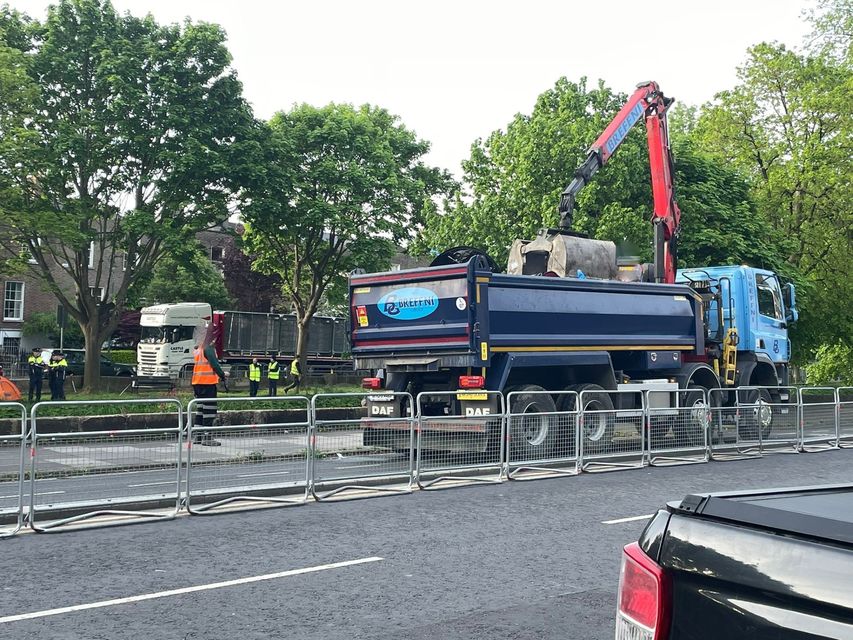Dublin’s ‘tent city’: Tents spring up in Ringsend and East Wall hours after asylum-seekers moved from Grand Canal
Dáil told tents have now sprung up in Ringsend and East Wall as Tánaiste is tackled on issueEarly-morning operation to remove Grand Canal tents completed, situation decried as ‘inhumane, unsustainable’ Relocation operation came just a week and a day after efforts to remove a large number of tents from Mount Street, where asylum-seekers had been living for monthsAsylum-seekers boarded buses at 7.30am and the tent-clearing operation was completed within an hour
Early morning operation to remove migrant camp from Dublin’s Grand Canal
Tents have now sprung up in Ringsend and East Wall, less than six hours after the clearance of the Grand Canal, the Dáil has been told.
A total of 163 people were moved to State-provided accommodation this morning, following the dismantling of a makeshift migrant camp along Dublin’s canal.
The East Wall area has already been a flashpoint for immigration protests, while in Ringsend there was an arson attack on a disused pub amid rumours it would be repurposed and used to house migrants.
Read more
Jennifer Whitmore of the Social Democrats told Tánaiste Micheál Martin that places that had seen tent cities had been fenced off, but it was hardly possible to fence off every street and road.
As Mr Martin attempted to explain the Government’s new approach, she interrupted: “I hope you have a large supply of fences, Tánaiste.”
"I hope you have a large supply of fences, Tánaiste" - Jennifer Whitmore tells Micheál Martin as Grand Canal tents cleared
On the clearance of 168 tents from along the Grand Canal, Sinn Féin spokesman Pearse Doherty said the Government was limping from crisis to crisis.
“It’s clear that you have no coherent strategy or thorough plan to deal with this situation. Last week the Taoiseach said he would not allow makeshift shanty towns to develop in Dublin or any other cities or towns,” he said.
“So can you assure the Dáil today that we will not be back here next week facing a similar situation with another 100 tents erected down by the canal or indeed anywhere else across the city?”
The Tánaiste replied that it was “not sustainable” for tents to be either on the canal or anywhere in the public realm.
“It’s not good for migrants, not good for asylum-seekers, nor for residents, or the general area. I think it’s just simply not acceptable,” Mr Martin said. “There is a plan resolutely to deal with tents wherever they arise.”
Integration Minister Roderic O’Gorman said An Garda Síochána was taking a “humane approach” to the encampment given that the asylum-seekers had not yet received an offer of accommodation.
He said there are criminal sanctions attached to some elements of pitching tents on public spaces.
“I think in recent weeks An Garda Síochána have taken the humane approach to this, recognising that people had no alternatives,” he told RTÉ’s News at One.
Minister O’Gorman also confirmed that a sign had gone up in one of the International Protection Accommodation Services (IPAS) accommodation centres offering an increased daily allowance to asylum-seekers if they leave tented accommodation.
A photograph of the notice, seen by the Irish Independent, shows it states the IPAS is experiencing an accommodation capacity shortage and is unable to accommodate all applicants. It then states that “some residents in IPAS tented accommodation have indicated they would prefer to take up an increased weekly allowance payment totalling €113.80”.
The notice states: “Any [applicant] who wishes to voluntarily depart IPAS tented accommodation during the current accommodation capacity shortage will be eligible to receive an increase to the Daily Expense Allowance (DEA) in the amount of €75 per week, bringing the total payment to €113.80 per week.
“When the capacity shortage has passed, a new offer of accommodation will be made to those who take up this option. This offer will not be to tented accommodation, but will be for standard accommodation.”
Reacting today, Mr O’Gorman said: “At one of our accommodation locations, a sign was put up indicating that where people felt they could self-accommodate that option was open to them. This doesn’t reflect IPAS policy and I’ve instructed that sign to be taken down,” he said.
Earlier, Taoiseach Simon Harris said there would be a continued “comprehensive response” to the asylum-seeker accommodation crisis.
Speaking at a press conference a short time after the clearance operation, Mr Harris said there would not be a situation where another camp would be allowed to stay for weeks or months, adding: “Those days are gone. Those days are over. That’s not gonna happen and the Government is absolutely united in relation to this.”
Asked if the Government would continue to block off public spaces with fences, Mr Harris said: “The multi-agency response involves a number of different actions happening.
“It doesn’t involve the long-term erection of barriering off parts of our city, but in the short term that can be a requirement.”
He would not define what he considered to be “short term” but said he would not expect it to be months.
Asylum-seekers who were relocated from the Grand Canal this morning were brought by bus to Crooksling in southwest Co Dublin and to the grounds of the former Central Mental Hospital in Dundrum.
The Government Press Office said 148 individuals were moved to Crooksling accommodation centre on the N81 between Tallaght and Blessington, and 15 individuals were moved to Dundrum.
The operation to remove Dublin’s second ‘tent city’ along the Grand Canal was completed within two hours this morning.
Asylum-seekers had pitched almost 100 tents there in recent days, a short walk from the nearby International Protection Office.
The operation came just a week after efforts to remove a large number of tents from Mount Street, where asylum-seekers had been living for months.
Barriers were erected around the canal area before 6am this morning, in a similar approach taken with the Mount Street operation last week.
In a distinctly quicker operation than last week, teams of people picked up the tents and cleared and cleaned the area, while a large number of asylum-seekers boarded buses by 7.30am.
Crews checked each tent was clear before spray-painting an “X” and a number on the side of it. They were bundled into a pile, before a “grabber” machine loaded the cleared tents onto a truck.
The whole tent-clearing operation was completed within the hour, by 7.45am.
The men gathered at the designated coaches waiting to be transported to an IPAS centre and the last bus left the area by 8.15am.
In a statement, the Government Press Office said: “A joint operation between the Department of Children, Equality, Disability, Integration and Youth; the Department of Justice; An Garda Síochána; Dublin City Council’s Dublin Regional Homelessness Executive; Waterways Ireland; and the HSE got under way early this morning on the Grand Canal, Dublin.
Read more
“The purpose of the operation is to ensure the safe movement of people seeking international protection from the tents on the Grand Canal to IPAS-designated accommodation.
“Some 163 individuals have now been safely moved to Crooksling and the former Central Mental Hospital (CMH) in Dundrum.”
“Both sites have robust, weather-proof tents. They have toilets and showers; health services; indoor areas where food is provided; facilities to charge phones and personal devices; access to transport to and from Dublin city centre; and 24-hour onsite security,” it added.
An operation to remove Dublin’s second ‘Tent City’ along the Grand Canal was completed within two hours this morning. Photo: Conor Feehan
“While accommodated at the sites in Crooksling and Dundrum, residents will receive the same supports as at other IPAS locations. This includes access to medical care via the HSE social inclusion outreach teams and medical card provision; IPAS customer services team clinics; onsite support from the provider’s staff; and psycho-social and integration support from NGO partners.
“The encampment at the Grand Canal has been dismantled and the area is being cleaned by Waterways Ireland,” the statement said.
‘Unsustainable’
Labour leader Ivana Bacik, who is also a local TD for the area, welcomed the early-morning move of international protection applicants to what she hopes is “appropriate and secure accommodation elsewhere”.
She said the situation was “inhumane and unsustainable”, where asylum-seekers had been left with “no option but to sleep in tents along the canal” without adequate sanitation facilities or security.
Ms Bacik acknowledged that more international protection applicants are likely to arrive in the coming days and the current approach by Government is “unsustainable”.
She reiterated calls for the Government to consider the reopening of Baggot Street Hospital and pursue expert recommendations to build six State-run centres, adding that a “change of tack” is necessary.
“It is not appropriate that we would see public realm spaces fenced off in this way, absolutely not, and I’ll be, again, calling on Government to ensure that this is just short term. I am glad that the multi-agency operation was carried out with dignity and respect. I understand that to be the case from local volunteers who were here.”
Notice
The second relocation in a week came as the Irish Independent reported that asylum-seekers in Dublin were offered an extra daily allowance to leave their tents and find private accommodation.
The offer to pay the extra allowance was made with the added incentive that those who accept it will be provided with non-tented accommodation when the capacity shortage has passed.
However, it was described as “pathetic” by Labour TD Aodhán Ó Ríordáin.
It is understood a notice had been posted in the IPAS offices, where it can by seen by asylum-seekers.
A photograph of the notice, seen by the Irish Independent, shows it states that IPAS is experiencing an accommodation capacity shortage and is unable to accommodate all applicants. It then states that “some residents in IPAS tented accommodation have indicated they would prefer to take up an increased weekly allowance payment totalling €113.80”.
There is an apparent inference that these people would depart the system.
The notice stated: “Any [applicant] who wishes to voluntarily depart IPAS tented accommodation during the current accommodation capacity shortage will be eligible to receive an increase to the Daily Expense Allowance (DEA) in the amount of €75 per week, bringing the total payment to €113.80 per week.
“When the capacity shortage has passed, a new offer of accommodation will be made to those who take up this option. This offer will not be to tented accommodation, but will be for standard accommodation.”
New tents spring up despite pledges from the Government that this would not be allowed to happen
An email address linked to the Department of Equality and Integration appeared at the end of the notice. It asks those who want to enquire about the offer to use the term “DEA offer” in their subject line.
Commenting on the notice yesterday, Mr Ó Ríordáin said it looked like the Government was “trying to buy people off”.
He said: “Is this the approach? Is this the answer? It’s absolutely pathetic. It sounds, again, like a department who have absolutely no concept of how to deal with this issue long term.
“Giving people a few bob so they won’t add to the statistics. It’s disgusting. Anybody looking at that would realise that it’s firefighting. It’s not coherent and it’s not going to work.”
Read more
Join the Irish Independent WhatsApp channel
Stay up to date with all the latest news















